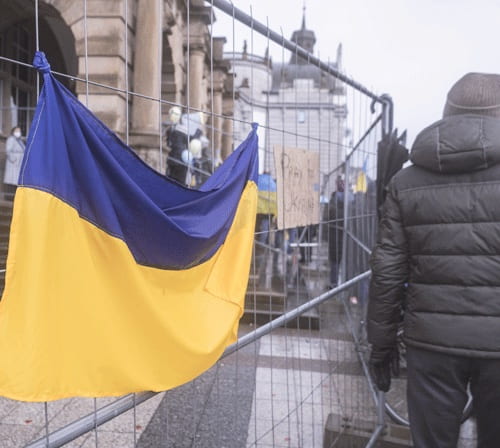By Joe Barnes
Bonner Means Baker Fellow
The war in Ukraine grinds on. Russia’s invasion, now nearly three months old, has been a strategic fiasco for Moscow. President Vladimir Putin’s dreams of a swift victory have been utterly smashed by a combination of breathtaking Russian incompetence, fierce Ukrainian resistance, and a rising flood of Western weaponry to Kyiv. Russia’s offensive in Donbas has stalled. The Ukrainian military is pushing Russian forces away from the eastern city of Kharkiv. Russia’s shocking losses in both personnel and equipment continue to hamper its ability to launch major attacks. This is unlikely to change soon, given severe constraints on Russia’s ability to ramp up production of military equipment or introduce trained troops to the battlefield. The military failure of Russia’s invasion will no doubt be the subject of countless articles and books. But failure it most assuredly is. Not least, the brutality of the Russian invasion, which has included the mass execution of civilians, has led to international revulsion, bolstering the resolve of countries, particularly in the West, as they take additional steps to support Ukraine.
Beyond the battlefield, Russia faces a similarly bleak picture. Far from weakening NATO, the invasion of Ukraine has energized the alliance in ways not seen since the Cold War. Germany, long a laggard in its budgetary commitment to NATO, has announced its intention to substantially increase its military expenditures. Two formerly neutral countries – Finland and Sweden – are poised to join the organization. The United States, working with the EU, has imposed unprecedented economic sanctions on Russia. There has even been progress, however fitful, on limiting Russian energy exports to the EU. This is a sensitive subject, given Russia’s importance in energy markets, particularly its role as a major natural gas supplier to Europe. Russia will pay a heavy economic price for Putin’s aggression against Ukraine.
How will the war in Ukraine end? One thing is clear: not soon. Earlier talks between Russia and Ukraine faltered. Mediation attempts by Turkey, Israel and France have failed. There is little incentive for either side to conclude a peace agreement. From Ukraine’s perspective, any deal that leaves Russia in control of Ukrainian territory seized since the invasion began on February 24 is unacceptable. This is particularly true now, when the tide of battle appears to have shifted in Ukraine’s favor. For its part, Russia is opposed to any agreement that would reveal, even more starkly, the dismal failure of Putin’s decision to invade Ukraine.
Even a ceasefire will be difficult to achieve. Ukraine would fear – quite rightly – that any demarcation line would leave substantial portions of Ukrainian territory still in Russian hands and likely to remain so for the foreseeable future. It will be difficult for Europeans who would like a ceasefire – France and Germany – to bring enough pressure on Kiev to compel its concurrence in even a temporary ceasefire. Any such pressure would prompt a sharp backlash, not just among Ukrainians, but among the many in Europe and the United States who would see such an approach as a betrayal of Ukraine and a de facto reward for Russian aggression.
The Biden administration is likely to continue its current policy of no direct intervention but strong support for the Ukraine. While there are opponents to his policy on both the Left and especially the Right, he commands bipartisan congressional support for his general approach. Still, the administration and U.S. allies, in close consultation with Kyiv, need to start thinking about the endgame. And this begins with clarifying what we view as acceptable outcomes of the war. Removal of Russian troops from areas occupied since the beginning of the invasion? End of Russian control in parts of Donbas seized by Moscow-backed separatists in 2014? The surrender of Crimea, annexed by Russia the same year? Regime change in Moscow? Not least, we need to consider a scenario under which Moscow, facing total defeat in Ukraine, resorts to weapons of mass destruction, especially tactical nuclear weapons. This may be a low probability. But it is one of huge potential ramifications.
The conflict has become in important ways a proxy war between NATO and Russia. Weakening Russia is surely not the only reason the U.S. and the West support Ukraine. The invasion is, first and foremost, an outrageous affront to international laws and norms. And the plight of Ukraine, under assault by naked aggression, has rightly prompted an outpouring of support from fellow democracies. But the war has substantial geopolitical ramifications. And Western support for Ukraine – by weakening Russia – strengthens NATO’s geopolitical hand. Merely making good on its losses in personnel and equipment in Ukraine will take Russia years, making it a much less formidable foe for NATO.
And the killing goes on.
